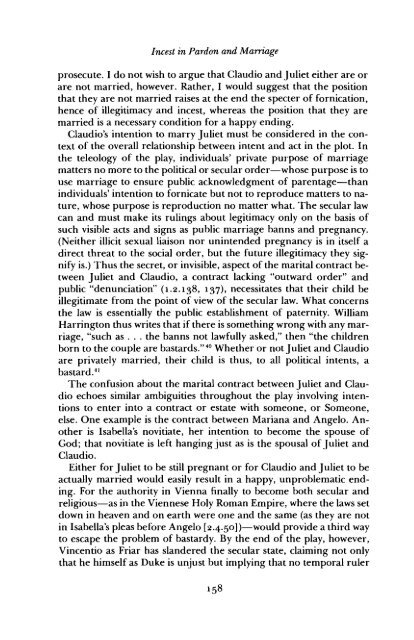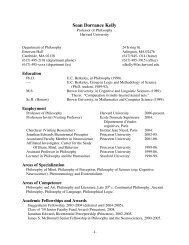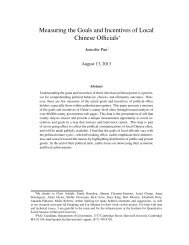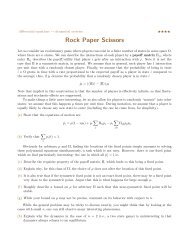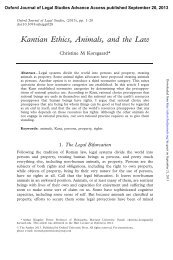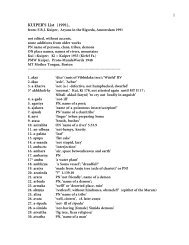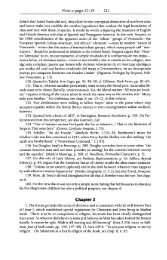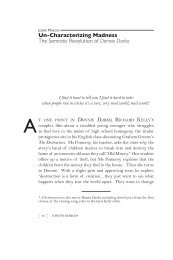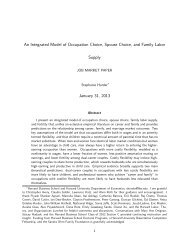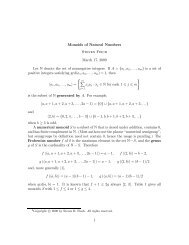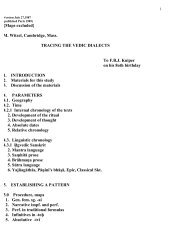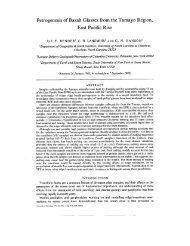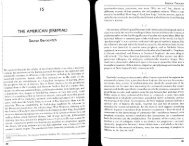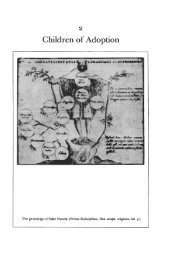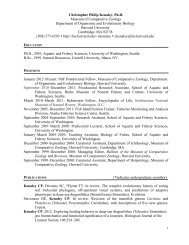Incest in Pardon and Marriage - People Fas Harvard
Incest in Pardon and Marriage - People Fas Harvard
Incest in Pardon and Marriage - People Fas Harvard
You also want an ePaper? Increase the reach of your titles
YUMPU automatically turns print PDFs into web optimized ePapers that Google loves.
<strong>Incest</strong> <strong>in</strong> <strong>Pardon</strong> <strong>and</strong> Maniage<br />
prosecute. I do not wish to argue that Claudio <strong>and</strong> Juliet either are or<br />
are not married, however. Rather, I would suggest that the position<br />
that they are not married raises at the end the specter of fornication,<br />
hence of illegitimacy <strong>and</strong> <strong>in</strong>cest, whereas the position that they are<br />
married is a necessary condition for a happy end<strong>in</strong>g.<br />
Claudio's <strong>in</strong>tention to marry Juliet must be considered <strong>in</strong> the con-<br />
text of the overall relationship between <strong>in</strong>tent <strong>and</strong> act <strong>in</strong> the plot. In<br />
the teleology of the play, <strong>in</strong>dividuals' private purpose of marriage<br />
matters no more to the political or secular order-whose purpose is to<br />
use marriage to ensure public acknowledgment of parentage-than<br />
<strong>in</strong>dividuals' <strong>in</strong>tention to fornicate but not to reproduce matters to na-<br />
ture, whose purpose is reproduction no matter what. The secular law<br />
can <strong>and</strong> must make its rul<strong>in</strong>gs about legitimacy only on the basis of<br />
such visible acts <strong>and</strong> signs as public marriage banns <strong>and</strong> pregnancy.<br />
(Neither illicit sexual liaison nor un<strong>in</strong>tended pregnancy is <strong>in</strong> itself a<br />
direct threat to the social order, but the future illegitimacy they sig-<br />
nify is.) Thus the secret, or <strong>in</strong>visible, aspect of the marital contract be-<br />
tween Juliet <strong>and</strong> Claudio, a contract lack<strong>in</strong>g "outward order" <strong>and</strong><br />
public "denunciation" (1.2.138, 137), necessitates that their child be<br />
illegitimate from the po<strong>in</strong>t of view of the secular law. What concerns<br />
the law is essentially the public establishment of paternity. William<br />
Harr<strong>in</strong>gton thus writes that if there is someth<strong>in</strong>g wrong with any mar-<br />
riage, "such as . . . the banns not lawfully asked," then "the children<br />
born to the couple are bastard^."^' Whether or not Juliet <strong>and</strong> Claudio<br />
are privately married, their child is thus, to all political <strong>in</strong>tents, a<br />
bastard."<br />
The confusion about the marital contract between Juliet <strong>and</strong> Clau-<br />
dio echoes similar ambiguities throughout the play <strong>in</strong>volv<strong>in</strong>g <strong>in</strong>ten-<br />
tions to enter <strong>in</strong>to a contract or estate with someone, or Someone,<br />
else. One example is the contract between Mariana <strong>and</strong> Angelo. An-<br />
other is Isabella's novitiate, her <strong>in</strong>tention to become the spouse of<br />
God; that novitiate is left hang<strong>in</strong>g just as is the spousal of Juliet <strong>and</strong><br />
Claudio.<br />
Either for Juliet to be still pregnant or for Claudio <strong>and</strong> Juliet to be<br />
actually married would easily result <strong>in</strong> a happy, unproblematic end-<br />
<strong>in</strong>g. For the authority <strong>in</strong> Vienna f<strong>in</strong>ally to become both secular <strong>and</strong><br />
religious-as <strong>in</strong> the Viennese Holy Roman Empire, where the laws set<br />
down <strong>in</strong> heaven <strong>and</strong> on earth were one <strong>and</strong> the same (as they are not<br />
<strong>in</strong> Isabella's pleas before Angelo [2.4.~jo])-wouId provide a third way<br />
to escape the problem of bastardy. By the end of the play, however,<br />
V<strong>in</strong>centio as Friar has sl<strong>and</strong>ered the secular state, claim<strong>in</strong>g not only<br />
that he himself as Duke is unjust but imply<strong>in</strong>g that no temporal ruler


